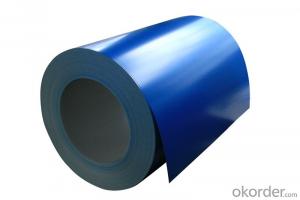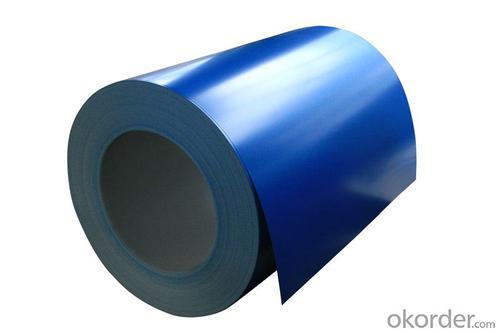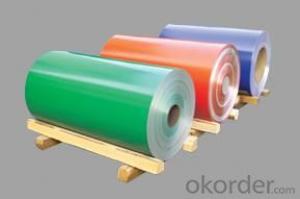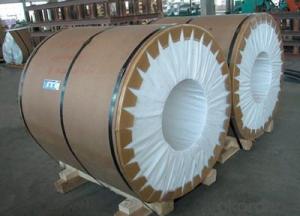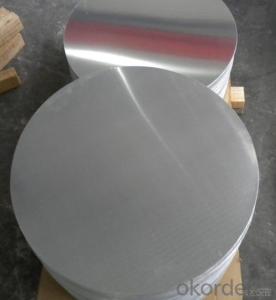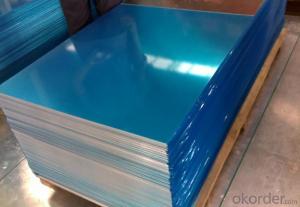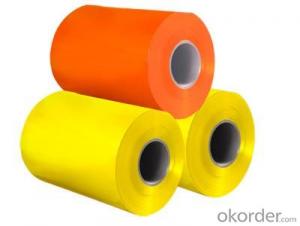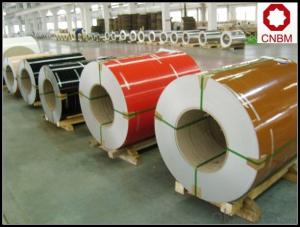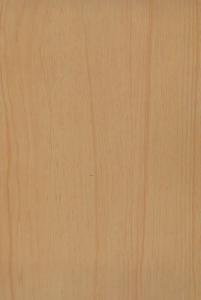Vinyl Coated Aluminum Coil for HVAC Equipments
- Loading Port:
- Shanghai
- Payment Terms:
- TT OR LC
- Min Order Qty:
- 5 m.t.
- Supply Capability:
- 60000 m.t./month
OKorder Service Pledge
OKorder Financial Service
You Might Also Like
Specification
Color Coated Aluminium Roll For HAVC Equipment
Specifications
Grade | 1050,1060,1070, 1100, 1200, 2024,3003, 3004,3005, 3105, 5005,5052 5182,5754,8011 etc |
Thickness | 0.1~1.5mm |
Width | 100~2500mm |
Surface Treatment | PVDF and PE coated |
Temper | O-H112 |
Hardness | More than 2H |
Yield(≥MPa) | 160 |
Ultimate Strength(≥MPa) | 175 |
Elongation(≥%) | 6 |
Packing Material | Moisture-proof agent, steel tape bundle, wooden pallet, brown paper |
Method | Vertical(eye to sky) or horizontal(eye to wall) |
Standard Specification | 1000mm×C, 1200mm×C, etc |
Shipping | Container Loading or Bulk Pack |
Characteristics
1) Excellent weather-proof durability
2) Anti-ultraviolet
3) High erosion resistance
4) Stable color and gloss
5) Good mechanical processing performance
6) Abrasion resistance
7) Anti-impact
8) High flexibility
Application
1) Construction material further processing
2) Solar cell frame, solar battery frame
3) Glass curtain wall frame
4) Interior decoration
5) Elevator decoration
6) Signs, nameplate, bags making.
7) Automobile parts material
8) Office and Household appliances: HVAC equipments
9) The consumer electronics: mobile phones, digital cameras, MP3 .etc.
Coating varieties
Polyester Coatings (PE)
PE (polyester) coatings exhibit an excellent combination of hardness, flexibility, flow, appearance, and superior resistance to dirt retention in indoor and outdoor applications. These coatings are highly resistant to abrasion, metal marking, staining, and marring, and require minimal maintenance. Glazetech uses polyester paints which provide excellent colour and gloss retention properties.
Polyvinylidene Fluoride Coatings (PVDF)
PVDF (polyvinylidene fluoride) is a chemical resistant thick film barrier coating commonly used in architectural applications where both excellent appearance and substrate protection must be maintained over a long period of time. This coating is unaffected by most chemicals and solvents and has excellent wear and abrasion resistance. PVDF also has a high dielectric strength, excellent resistance to weathering and the ability to self extinguish.
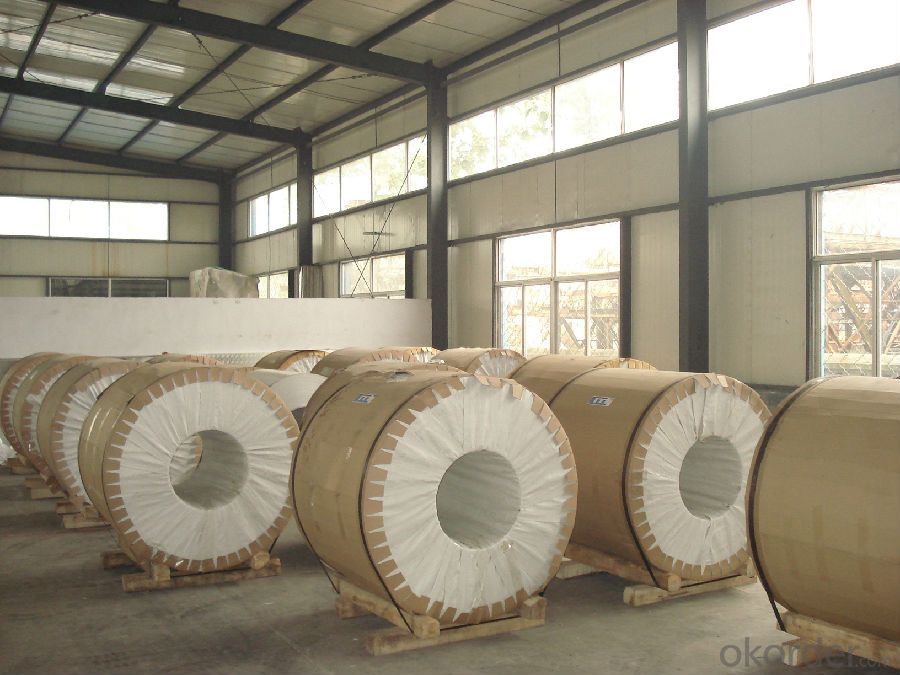
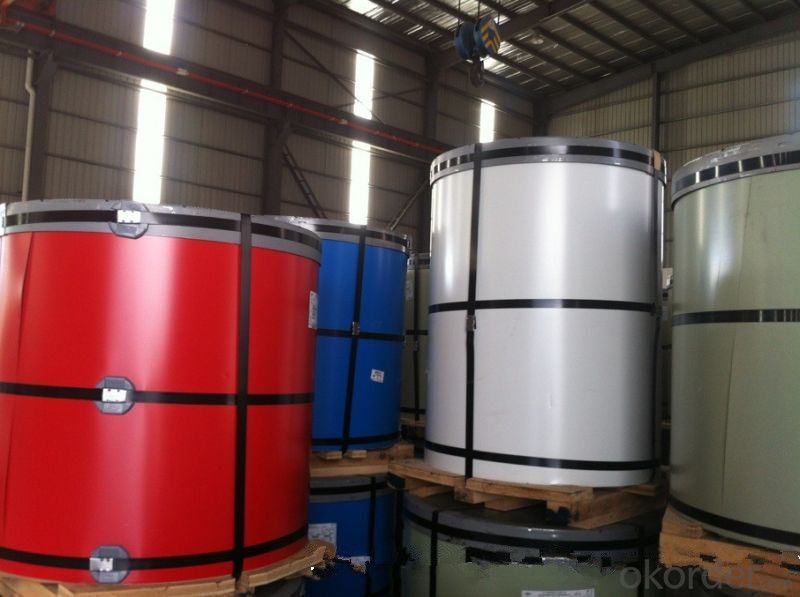
- Q: What are the potential applications of anodized aluminum coils?
- Anodized aluminum coils have numerous potential applications across various industries. One of the primary uses of anodized aluminum coils is in the construction industry. They are commonly used for cladding and façade systems, as the anodized coating enhances the durability, weather resistance, and aesthetic appeal of the aluminum. Anodized aluminum coils can withstand harsh environmental conditions, such as UV radiation, saltwater exposure, and extreme temperatures, making them an ideal choice for building exteriors. Another significant application of anodized aluminum coils is in the automotive industry. The anodized coating provides a protective layer that enhances the corrosion resistance of aluminum, making it suitable for various automotive components. It can be used for trim, body panels, window frames, and other parts that require both durability and an attractive appearance. Anodized aluminum coils also find use in the manufacturing of consumer electronics. The anodized coating improves the scratch resistance, electrical insulation, and heat dissipation properties of aluminum, making it suitable for electronic enclosures, heat sinks, and connectors. Additionally, the vibrant colors that can be achieved through anodization allow for customizable designs that appeal to consumers. Due to its lightweight nature and excellent heat conductivity, anodized aluminum coils are extensively used in the heating, ventilation, and air conditioning (HVAC) industry. They are commonly used for heat exchangers, air conditioning coils, and evaporator coils. The anodized coating provides protection against corrosion caused by moisture and other environmental factors, ensuring the longevity and efficiency of these HVAC components. Furthermore, anodized aluminum coils have applications in the food and beverage industry. The anodized coating provides a hygienic surface that is easy to clean and resistant to bacterial growth. It is used for food processing equipment, storage tanks, and packaging materials, ensuring the safety and quality of the products. Overall, the potential applications of anodized aluminum coils are vast and diverse, ranging from construction and automotive to electronics and food processing. The unique combination of durability, corrosion resistance, heat dissipation, and aesthetic appeal makes anodized aluminum coils a versatile material that finds use in numerous industries.
- Q: May anyone tell me what's the product when hydrochloric acid reacts with aluminum?HCl + Al → ?
- AlCl3 + H2
- Q: My mom was being an idiot and used the steel spatula to scrape the cookies off an aluminum cookie sheet. Now there are small bits of aluminum on the bottom of the cookies. I just ate a few of them (5) before i noticed it, should I be worried?
- It would only be a problem if you constantly expose yourself to aluminum filings. Heavy metals (things like lead or mercury) are toxic to people. What most people don't realize is that that in order for these metals to be toxic, you have to be exposed to them for a long period of time and in fairly large quantities. In general, lead is in your tap water. You've probably accidently drank more aluminum filings from soda cans than you have eaten from those cookies. Still though, there is no point in trying to expose yourself to something you know you shouldn't have in your body. So I wouldn't eat any more.
- Q: Are there any limitations on the bending or shaping of aluminum coils?
- Aluminum coils do have limitations when it comes to bending or shaping. Despite being a soft and malleable metal, there are factors that can affect its bendability. The thickness of the aluminum coil plays a role in its bendability. Thicker coils are generally more difficult to bend compared to thinner ones because they have increased resistance to deformation. The temper or hardness of the aluminum coil also affects its bendability. Different tempers, such as soft, half-hard, or hard, have varying degrees of malleability. Soft tempers are easier to bend, while harder ones require more force and may be prone to cracking or breaking during bending. The desired bend or shape's design and complexity can impose limitations as well. Sharp bends or intricate shapes may cause the aluminum coil to crack or deform, especially if it lacks proper support or if the bending radius is too small. Impurities, defects, or alloying elements present in the aluminum coil can also impact its bendability. These factors can lead to inconsistencies in the material's mechanical properties, making it more susceptible to cracking or breaking during bending or shaping. Therefore, it is crucial to consider the thickness, temper, design, and quality of the aluminum coil to ensure successful and safe bending and shaping.
- Q: What are the different types of surface finishes for decorative purposes?
- There are several different types of surface finishes that are commonly used for decorative purposes. These finishes can enhance the appearance of a surface, adding texture, depth, and visual interest. Some of the most popular types of surface finishes for decorative purposes include: 1. Polished: Polished finishes are smooth and shiny, creating a reflective surface. This finish is achieved by polishing the surface using abrasive materials, resulting in a glossy appearance. 2. Matte: Matte finishes have a flat, non-reflective surface. They are achieved by using sandpaper or other materials to create a smooth but dull appearance. Matte finishes are often used to create a more subtle and understated aesthetic. 3. Brushed: Brushed finishes have a distinctive linear pattern that is created by brushing the surface with a wire brush or abrasive material. This finish is commonly used on metals, such as stainless steel, to create a textured and visually interesting look. 4. Textured: Textured finishes involve adding patterns or designs to the surface through various techniques. This can include embossing, engraving, or applying a textured coating. Textured finishes can add depth and dimension to a surface, creating a unique and visually appealing effect. 5. Antiqued: Antiqued finishes are designed to mimic the appearance of aged or weathered surfaces. This can be achieved through techniques such as distressing, staining, or adding a patina. Antiqued finishes are often used to create a vintage or rustic look. 6. Metallic: Metallic finishes use metallic pigments or coatings to create a shiny and reflective appearance. This finish can add a touch of elegance and sophistication to a surface, making it a popular choice for decorative purposes. 7. High gloss: High gloss finishes have an extremely smooth and reflective surface, creating a mirror-like effect. This finish is achieved by applying multiple layers of clear coat or lacquer and polishing the surface to a high shine. High gloss finishes are often used to create a modern and luxurious look. Overall, the choice of surface finish for decorative purposes depends on the desired aesthetic and the type of material being used. Each finish has its own unique qualities and can greatly enhance the overall visual appeal of a surface.
- Q: How do aluminum coils contribute to improved indoor air quality?
- Aluminum coils contribute to improved indoor air quality by efficiently removing heat and moisture from the air, preventing the growth of mold and mildew. Additionally, aluminum coils are resistant to corrosion, reducing the risk of air contamination caused by rust or other harmful particles.
- Q: What is the impact of alloy purity on the performance of aluminum coils?
- The purity of alloys used in aluminum coils has a significant impact on their performance. Alloy purity refers to the absence of impurities or contaminants within the aluminum material. One crucial factor affected by alloy purity is the mechanical strength of the aluminum coils. Impurities in the alloy can weaken the overall structure and reduce its tensile strength. Higher purity alloys tend to have better mechanical properties, allowing the coils to withstand higher loads and stresses without deformation or failure. Alloy purity also influences the electrical conductivity of aluminum coils. Impurities such as iron, copper, or silicon can increase the electrical resistance, leading to losses in electrical energy during transmission. Higher purity alloys have lower electrical resistivity, ensuring efficient power transmission and minimizing energy losses. Another critical aspect influenced by alloy purity is the corrosion resistance of aluminum coils. Impurities can act as catalysts for corrosion, reducing the coil's lifespan and durability. Higher purity alloys exhibit improved resistance to corrosion, making them suitable for various applications, including those in corrosive environments. Additionally, the thermal conductivity of aluminum coils is affected by alloy purity. Impurities hinder the efficient transfer of heat, reducing the overall thermal performance. Higher purity alloys have better thermal conductivity, allowing for effective heat dissipation and improved thermal management in applications such as heat exchangers or cooling systems. In conclusion, the impact of alloy purity on the performance of aluminum coils is significant. Higher purity alloys offer improved mechanical strength, electrical conductivity, corrosion resistance, and thermal conductivity. Thus, selecting alloys with higher purity levels is crucial for ensuring optimal performance and longevity of aluminum coils in various applications.
- Q: What are the different thicknesses available for aluminum coils?
- The thicknesses available for aluminum coils can vary, but common options typically range from 0.015 inches to 0.25 inches.
- Q: What's the difference between an aluminum alloy strip and an aluminum coil?
- The specifications are different. Generally speaking, the aluminum strips are of small size, and the aluminum rolls are of large size
- Q: Some manufactures (Kia, Hundai) use Iron blockswhileOther manufactures (Nissan, Chevy, ect.) use Aluminum blocks*****Is the point of using Iron blocks to increase long-term durability or temperature endurance??ORIs the use of Iron blocks simply an older, simpler technology (as compared to using Aluminum), the manufacture of which costs less money??And you would think that Aluminum weight savings would transer to better MPG, but the Kia gets very comparable mileage anyway.Thank you
- Aluminum's main advantages are weight and increased mpg for CAFE regulations. If you are going to keep your car to 150,000 miles eitheir block material will do. But if you are going to keep it 300,000 to the bitter, bitter end, you are better off with iron.
Send your message to us
Vinyl Coated Aluminum Coil for HVAC Equipments
- Loading Port:
- Shanghai
- Payment Terms:
- TT OR LC
- Min Order Qty:
- 5 m.t.
- Supply Capability:
- 60000 m.t./month
OKorder Service Pledge
OKorder Financial Service
Similar products
Hot products
Hot Searches
Related keywords
